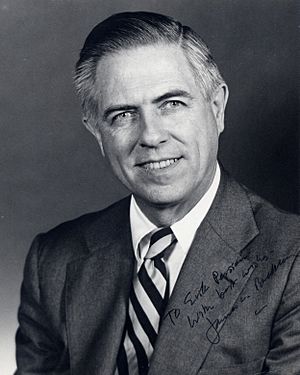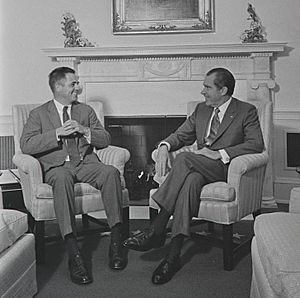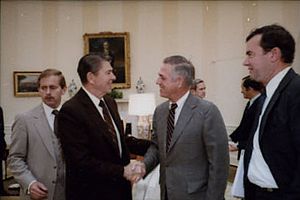James L. Buckley facts for kids
Quick facts for kids
James L. Buckley
|
|
|---|---|

Buckley in the 1970s
|
|
| Senior Judge of the United States Court of Appeals for the District of Columbia Circuit | |
| In office August 31, 1996 – August 18, 2023 |
|
| Judge of the United States Court of Appeals for the District of Columbia Circuit | |
| In office December 17, 1985 – August 31, 1996 |
|
| Appointed by | Ronald Reagan |
| Preceded by | Edward Allen Tamm |
| Succeeded by | John Roberts |
| Counselor of the Department of State | |
| In office September 9, 1982 – September 26, 1982 |
|
| President | Ronald Reagan |
| Preceded by | Robert McFarlane |
| Succeeded by | Ed Derwinski |
| Undersecretary of State for International Security Affairs | |
| In office February 28, 1981 – August 20, 1982 |
|
| President | Ronald Reagan |
| Preceded by | Matthew Nimetz |
| Succeeded by | William Schneider Jr. |
| United States Senator from New York |
|
| In office January 3, 1971 – January 3, 1977 |
|
| Preceded by | Charles Goodell |
| Succeeded by | Daniel Patrick Moynihan |
| Personal details | |
| Born |
James Lane Buckley
March 9, 1923 New York City, U.S. |
| Died | August 18, 2023 (aged 100) Washington, D.C., U.S. |
| Political party | Conservative (until 1976) Republican (1976–2023) |
| Spouse |
Ann Frances Cooley
(m. 1953; died 2011) |
| Children | 6 |
| Parent |
|
| Relatives |
|
| Education | Yale University (BA, LLB) |
| Military service | |
| Allegiance | |
| Branch/service | |
| Years of service | 1942–1946 |
| Rank | |
| Battles/wars | World War II |
James Lane Buckley (March 9, 1923 – August 18, 2023) was an American politician and judge. He was known for serving in all three parts of the U.S. government: the executive (President's team), legislative (Congress), and judicial (courts).
Buckley was a United States Senator for New York from 1971 to 1977. He was part of the Conservative Party of New York State but worked with the Republican group in the Senate. Later, he held several important jobs during President Ronald Reagan's time in office. He also became a judge on the United States Court of Appeals for the District of Columbia Circuit.
Contents
Early Life and Education
James Lane Buckley was born in New York City on March 9, 1923. He was one of ten children. His father was William Frank Buckley Sr.. James was the older brother of the famous writer William F. Buckley Jr..
He went to Yale University and earned a degree in English in 1943. While at Yale, he was part of a secret society called Skull and Bones.
Military Service in World War II
Buckley joined the United States Navy in 1942 during World War II. He took part in important battles like Leyte, Lingayen Gulf, and Okinawa. He left the Navy in 1946 as a Lieutenant (junior grade).
After the war, he went back to Yale Law School and got his law degree in 1949. He worked as a lawyer until 1953. In May 1953, he married Ann Frances Cooley, and they had six children.
Political Career

Serving in the U.S. Senate
Senate Elections
In 1968, James Buckley first ran for a Senate seat in New York. He ran as a candidate for the Conservative Party of New York State. He came in third place in that election.
Two years later, in 1970, Buckley ran for the Senate again. This time, he won the election with 39 percent of the votes. He served as a U.S. Senator from 1971 to 1977.
Time as Senator
During his time in the Senate, Buckley was known as a Conservative-Republican. He joined the Republican group in the Senate.
He worked on important issues, including environmental protection. He supported President Richard Nixon during the 1972 presidential election.
In 1974, Buckley suggested a "Human Life Amendment" to the U.S. Constitution. This amendment would have said that the word "person" in the Fourteenth Amendment includes an embryo.
He also helped create two important laws that protect students:
- The Family Educational Rights and Privacy Act (FERPA): This law controls how student records are used.
- The Protection of Pupils' Rights Act (PPRA): This law makes sure parents are told and give permission before their children take surveys that ask about certain personal topics.
Watergate Scandal and Resignation Call
In 1974, as the Watergate scandal grew, Buckley made a surprising move. He asked President Richard Nixon to step down from office. Buckley said he wasn't judging Nixon's guilt. Instead, he believed Nixon's resignation was the only way to help the country heal from the scandal. He was one of the first major conservative leaders to ask Nixon to resign. Nixon eventually resigned on August 9, 1974.
Buckley was also the main person in a very important Supreme Court case called Buckley v. Valeo (1976). This case helped shape the rules for how money is used in political campaigns today.
1976 Reelection Campaign
In 1976, Buckley ran for reelection to the Senate. He received the Republican nomination. However, he lost the election to the Democratic candidate, Daniel Patrick Moynihan.
After the Senate

After leaving the Senate, Buckley worked in business for a while. Then, he joined President Ronald Reagan's team. He served as an undersecretary for the State Department, helping manage military aid to other countries. From 1982 to 1985, he was also the President of Radio Free Europe/Radio Liberty, which broadcast news to countries behind the Iron Curtain.
Becoming a Judge
On October 16, 1985, President Ronald Reagan chose Buckley to be a judge. He was nominated to the United States Court of Appeals for the District of Columbia Circuit. The United States Senate approved his nomination on December 17, 1985. He became a judge on that same day.
In 1996, he took on "senior status" as a judge. This means he worked a reduced schedule but could still hear cases.
Later Life and Legacy
James Buckley became the oldest living former U.S. Senator in 2019. He celebrated his 100th birthday on March 9, 2023. He passed away on August 18, 2023, in Washington, D.C.
He is one of the few people in modern times to have served in all three main parts of the U.S. federal government:
- The executive branch (working for the President).
- The legislative branch (serving in the Senate).
- The judicial branch (working as a judge).
Books Written by James Buckley
Buckley wrote several books during his life:
- If Men Were Angels: A View from the Senate (1975)
- Gleanings from an Unplanned Life (2006)
- Freedom at Risk: Reflections on Politics, Liberty, and the State (2010)
- Saving Congress from Itself: Emancipating the States & Empowering Their People (2014)
Images for kids
See also
 In Spanish: James L. Buckley para niños
In Spanish: James L. Buckley para niños
 | John T. Biggers |
 | Thomas Blackshear |
 | Mark Bradford |
 | Beverly Buchanan |

